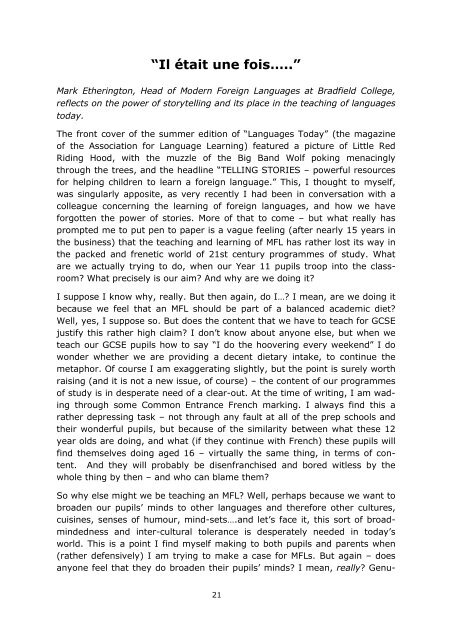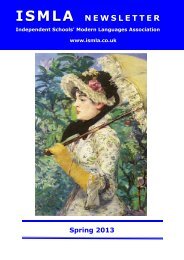Summer 2013 - The Independent Schools' Modern Language ...
Summer 2013 - The Independent Schools' Modern Language ...
Summer 2013 - The Independent Schools' Modern Language ...
You also want an ePaper? Increase the reach of your titles
YUMPU automatically turns print PDFs into web optimized ePapers that Google loves.
“Il était une fois…..”<br />
Mark Etherington, Head of <strong>Modern</strong> Foreign <strong>Language</strong>s at Bradfield College,<br />
reflects on the power of storytelling and its place in the teaching of languages<br />
today.<br />
<strong>The</strong> front cover of the summer edition of “<strong>Language</strong>s Today” (the magazine<br />
of the Association for <strong>Language</strong> Learning) featured a picture of Little Red<br />
Riding Hood, with the muzzle of the Big Band Wolf poking menacingly<br />
through the trees, and the headline “TELLING STORIES – powerful resources<br />
for helping children to learn a foreign language.” This, I thought to myself,<br />
was singularly apposite, as very recently I had been in conversation with a<br />
colleague concerning the learning of foreign languages, and how we have<br />
forgotten the power of stories. More of that to come – but what really has<br />
prompted me to put pen to paper is a vague feeling (after nearly 15 years in<br />
the business) that the teaching and learning of MFL has rather lost its way in<br />
the packed and frenetic world of 21st century programmes of study. What<br />
are we actually trying to do, when our Year 11 pupils troop into the classroom?<br />
What precisely is our aim? And why are we doing it?<br />
I suppose I know why, really. But then again, do I…? I mean, are we doing it<br />
because we feel that an MFL should be part of a balanced academic diet?<br />
Well, yes, I suppose so. But does the content that we have to teach for GCSE<br />
justify this rather high claim? I don’t know about anyone else, but when we<br />
teach our GCSE pupils how to say “I do the hoovering every weekend” I do<br />
wonder whether we are providing a decent dietary intake, to continue the<br />
metaphor. Of course I am exaggerating slightly, but the point is surely worth<br />
raising (and it is not a new issue, of course) – the content of our programmes<br />
of study is in desperate need of a clear-out. At the time of writing, I am wading<br />
through some Common Entrance French marking. I always find this a<br />
rather depressing task – not through any fault at all of the prep schools and<br />
their wonderful pupils, but because of the similarity between what these 12<br />
year olds are doing, and what (if they continue with French) these pupils will<br />
find themselves doing aged 16 – virtually the same thing, in terms of content.<br />
And they will probably be disenfranchised and bored witless by the<br />
whole thing by then – and who can blame them?<br />
So why else might we be teaching an MFL? Well, perhaps because we want to<br />
broaden our pupils’ minds to other languages and therefore other cultures,<br />
cuisines, senses of humour, mind-sets….and let’s face it, this sort of broadmindedness<br />
and inter-cultural tolerance is desperately needed in today’s<br />
world. This is a point I find myself making to both pupils and parents when<br />
(rather defensively) I am trying to make a case for MFLs. But again – does<br />
anyone feel that they do broaden their pupils’ minds? I mean, really? Genu-<br />
21



